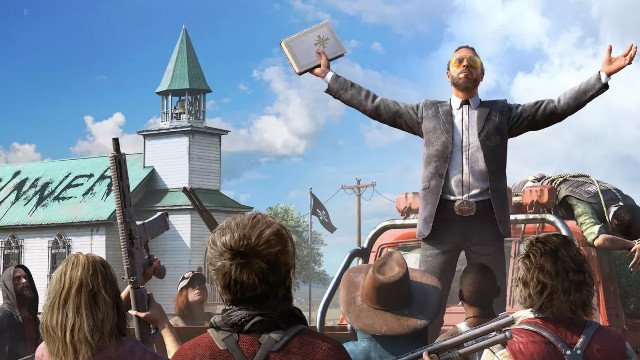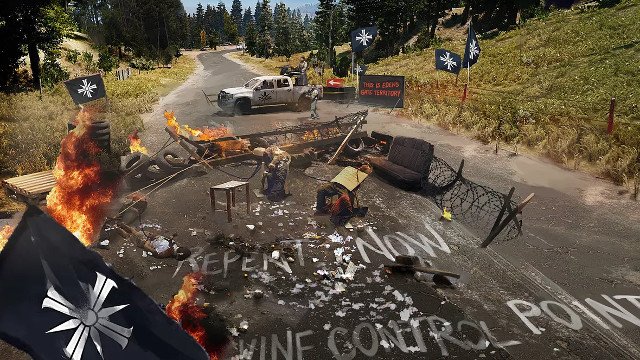Far Cry 5 is not the game that many thought it was going to be. With its anti-government, gun-toting, religious cult and shift to a modern-day US setting, it seemed primed to tackle current-day issues — early gameplay footage suggested as much, with some dialogue playing off America’s tense political climate. However, while the final game did reference US politics, as noted in our review its story is tonally all over the place, leading to some criticizing its approach to real-world themes. This has resulted in many admonishing games critics for factoring this facet of the game into their reviews, with us once again encircling the debate over politics in video games.
Video games rarely tackle modern politics, and it’s not difficult to see why. From a publisher’s perspective, a significant portion of their audience appears to be vocally conservative, and with conservatism now being as divisive as it ever has been, approaching this subject without alienating their potential player base may seem like too much of a risk. With triple-A games now mostly receiving the green light depending on how easily they’ll be able to accommodate future monetization, publishers seek to appeal to the broadest demographic possible, leading to fewer risky prospects being given the go-ahead in the process. It’s the boring reality of modern-day game development — publishers’ sales expectations have risen considerably over the years, so the most viable games are those that can wring cash out of their players over a sustained period of time. This is why we don’t see the release of as many triple-A single-player games, and why loot boxes and microtransactions have become prominent fixtures in the games industry.
The Far Cry series has largely revolved around the player-character taking to a tropical, foreign setting and dramatically altering its landscape. Far Cry 3 was criticized for embarking on a white savior narrative, with its white protagonist Jason dropping into this unknown world before promptly being hailed as some kind of religious deity by its indigenous people. CJ Kershner, a scriptwriter for Far Cry 4, later went on to say that Ubisoft had learned from that game’s mistakes, telling Polygon: “We don’t create our games in a vacuum. We were aware of the discussions happening about Far Cry 3. People identified some problems.”

Far Cry 5’s move to America and pre-release build suggested that it would potentially move in a new and more interesting direction, with the parallels to real-world extremism lending it a unique appeal compared to previous entries. Though the game went into development ahead of the 2016 election — lead writer Drew Holmes began working on the script in late 2014 — it was still rooted in societal issues that have only been exacerbated over the course of the past two years. Holmes even looked into the occupation of Oregon’s Malheur National Wildlife Refuge for reference, with separatism being a core theme that the concept of the game was built around. This isn’t a game that was built without the politics of its setting in mind, with rural Montana being strictly conservative despite its cities being dominated by Democrats, creating a tense political divide that has led to it being known as a “purple state.” However, some reviewers have expressed that it is a game that doesn’t want to scratch too deep beneath the surface of these politics, criticizing it for approaching difficult topics as inoffensively as possible.
Now that the game has been released, some feel that Ubisoft blew it in this regard and that despite setting up Far Cry 5 to seemingly provide some form of commentatory on modern conservatism, the political divide in the US, or the rise of separatist beliefs, it winds up not saying much about anything. It’s not as if this notion that Far Cry 5 would “go there” was conjured out of thin air; its promotional material had suggested that it was veering into current politics, to the point where some corners of the internet were concerned that it would be a game in which players would kill Trump supporters. However, several months following various right-wing outlets angrily reporting that Far Cry 5 would cast Christian conservatives as the baddies, the conversation around the game has now changed.
As Far Cry 5 reviews began surfacing, some referenced the game’s politics (or lack thereof) and criticized Ubisoft’s decision to refrain from delving deeper into its setting. In a review from Polygon, Ben Kuchera discussed how its developers appeared to have intentionally skirted around the controversies that should have naturally presented themselves.
“[Conservative/Christian commentators] shouldn’t worry; any thematic point to be made about religion, the United States or the current state of the nation’s politics is quickly thrown aside to make way for all sorts of jokes and lighthearted hijinks — although you’ll also see a lot of crucifixions in your travels,” Kuchera wrote. “It’s clear that this is a cult based on Christianity, but holy hell, is the game careful to dance around that fact. Ubisoft wanted the evocative art of these religious references for the marketing of Far Cry 5, but the game itself is too timid to do anything with them, let alone dig into their historical baggage.”

In a video released following a press demo of the game back in March, GameSpot also expressed how they were “confused” by the tone of the game. Referring to an NPC who discusses “Obama-lovin’ libtards,” a GameSpot commentator said: “I don’t understand the tone they’re going for with him — he’s not a villain, he’s a quest-giver so is he just meant to be an asshole? Am I supposed to like him? What are they trying to say with the characters in this game? I don’t really know.”
Another commentator added how he had made a black character before venturing into a game with “deeply conservative and gun-toting attitudes,” and how that had made him feel “deeply uncomfortable.” As a result of these comments, the video currently sits at around 23,000 dislikes and 850 likes.
The vehement response to opinions such as these serves to highlight the reason why current political and social issues are rarely tackled in the triple-A gaming industry. One of the most popular videos on the matter is from the channel ‘No Bullshit,’ which has amassed nearly 1.2 million views at the time of this writing, with it discussing the controversy using the title ‘Far Cry 5 Confuses SJWs Because Conservatives Aren’t Monsters.’

“It appears the main reason GameSpot is confused is because they expected all conservatives to be evil monsters or villains or something,” No Bullshit says in the video. “Yeah, shocking; people in middle America aren’t rainbow-haired, hipster feminists, and most of them aren’t bad people, either”
“Now remember when there was a time when pushing buttons and pushing the boundaries was something video games strived for,” he continues. “Now we’ve got all these weak, prissy, beta losers in charge of reviewing stuff, and everything’s too politically correct. They’re afraid to offend people, so that’s why these GameSpot guys are acting all upset about rednecks and conservative stuff here.”
Though No Bullshit is but one example in a sea of YouTubers complaining about games journalism online, his views serve to highlight the contradiction of criticizing the critics for wanting Far Cry 5 to push the boundaries a little more, and to tackle the inherent political and societal issues of its setting rather than place itself on the fence. If players are keen for video games to go back to “pushing the boundaries,” then surely critics’ complaints that Far Cry 5 didn’t do that would resonate with them? With that in mind, is it more likely a case of right-leaning commentators not being all too concerned with boundary-pushing, and them instead not wanting to see games push the boundaries into areas that make them personally uncomfortable? Unfortunately, with many finding themselves unable to handle critics discussing politics, let alone developers actually including politics in their games, it seems unlikely that the industry will greenlight games that dare to tackle contentious, contemporary topics anytime soon.







